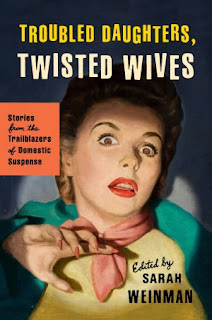Fourteen chilling tales from the pioneering women who created the domestic suspense genre
Murderous wives, deranged husbands, deceitful children, and vengeful friends. Few know these characters—and their creators—better than Sarah Weinman. One of today’s preeminent authorities on crime fiction, Weinman asks: Where would bestselling authors like Gillian Flynn, Sue Grafton, or Tana French be without the women writers who came before them?
In Troubled Daughters, Twisted Wives, Weinman brings together fourteen hair-raising tales by women who—from the 1940s through the mid-1970s—took a scalpel to contemporary society and sliced away to reveal its dark essence. Lovers of crime fiction from any era will welcome this deliciously dark tribute to a largely forgotten generation of women writers.
Q&A with editor Sarah Weinman
What inspired you to compile this anthology? Were you working on it before the big splash created by GONE GIRL?
TROUBLED DAUGHTERS emerged from an essay I wrote for the literary magazine Tin House. I'd been approached by an editor there to write something for their themed "The Mysterious" issue, and I'd long contemplated why it seemed that a fair number of female crime writers working around or after World War II through the mid-1970s weren't really part of the larger critical conversation. They weren't hard boiled per se, but they weren't out-and-out cozy, either. Hammett and Chandler and Cain, yes; but why not Marie Belloc Lowndes and Elisabeth Sanxay Holding and Vera Caspary? Why Ross Macdonald but not his wife, Margaret Millar, who published books before he did and garnered critical and commercial acclaim first? I knew after writing the essay that I wasn't done with the subject, and when I had lunch with an editor at Penguin on an unrelated matter and started going on, rather enthusiastically, about this widespread neglect, he said, "sounds like there's an anthology in this. Why don't you send me a proposal?" It took a while to organize, but eventually I did, and Penguin bought the anthology. Publishing being what it is, it's taken a little less than two years from acquisition to release date.
To answer your other question, I had just started putting the anthology together when it became clear that GONE GIRL was going to be a massive hit, and that I had a very easy one-sentence pitch for TROUBLED DAUGHTERS: “If you loved GONE GIRL, here's an entire generation of writers who helped make that book possible, and who deserve to be rescued from the shadows.” Flynn clearly tapped into contemporary anxieties about marriage, identity, high expectations, and whether we can really be true to ourselves and the ones we profess to love. So it's fascinating to explore an earlier time when many of the very same anxieties women had manifested itself, even as the very concept of independent womanhood was perceived to be a great threat.
What is “domestic suspense”? What relationship does it have to other kinds of crime fiction?
Domestic suspense is a catch-all term for work largely published by women and describing the plight of women -- wives, daughters, the elderly, spinsters, the underserved, the overlooked, and many other phrases used then but thankfully, not so much now -- as World War II was coming to a close and the feminist movement dawned. Without domestic suspense you couldn't have contemporary psychological suspense. Conversely, the work of people like Gillian Flynn, Laura Lippman, Megan Abbott, Sophie Hannah, Tana French, and many more would not be possible without the likes of Hughes, Jackson, Millar, Highsmith, and -- though not included in TROUBLED DAUGHTERS for reasons outside the scope of this interview -- Ruth Rendell, Mary Higgins Clark, Mignon Eberhart, and more.
Which one of the authors in your collection would you like to see get more credit?
Bear in mind my answer will change daily, but right now, I'll say Joyce Harrington. She won an Edgar Award for her very first short story – “The Purple Shroud”, included in TROUBLED DAUGHTERS – but she spent most of the 70s and 80s writing stories of equal if not greater excellence. Harrington also published three novels: No One Knows My Name (1981), set in a summer stock theater troupe; Family Reunion (1982), a very creepy Southern Gothic with quite the toxic family; and Dreemz of the Night (1987), a terrific mystery set in the then-contemporary New York City graffiti world. I love that book of hers the best because of the window it unexpectedly opened on a nearly unrecognizable version of the five boroughs.
What was the first domestic suspense you ever read?
Mary Higgins Clark’s Where Are The Children?, back in eleventh grade. That book scared the hell out of me, and only later did I realize what a pivotal book that was.
What is the difference between “classic” domestic suspense and the writing of the new generation (Megan Abbott, Laura Lippman, Gillian Flynn, Tana French, etc.)?
Largely the sensibility afforded by contemporary times. But there are many more similarities. For example, Lippman’s most recent novel, And When She Was Good, was about a suburban madam, and the way in which the suspense unfolded and she depicted Heloise’s nose for business and growing internal tensions could have been written by Margaret Millar sixty years ago (albeit with more dated references to technology.) When I first read Megan Abbott I thought immediately of Dorothy Hughes’ In A Lonely Place. The DNA of so many of these earlier writers inserted themselves into those writing today, whether they realize it consciously.
Do you think women write better domestic suspense? If so, why or why not?
I'm a big fan of Harlan Coben and Linwood Barclay’s work, both of whom certainly work in the domestic suspense field. Ira Levin’s books work so well because he knew exactly what domestic anxiety buttons to push – Rosemary’s Baby and The Stepford Wives absolutely count as domestic suspense (and, to a certain extent, A Kiss Before Dying.) That said, women are still struggling with the work/life balance, if I may drop in some cliches like “having it all” or “leaning in.” So there are more of them exploring these themes in a fictional universe, and that means more of them are doing so with great success and acclaim. I'd like to see more men write domestic thrillers and more women write traditionally “male” subgenres so that we can blur the lines once and for all. But forty, fifty, sixty years ago, there weren't as many options.
You mention in your intro to TROUBLED DAUGHTERS, TWISTED WIVES that the World Wars, particularly WWII, shaped the lives of domestic suspense writers, and consequently, what they wrote. Is there a similar “seismic event” that might have shaped the new domestic suspense, in your opinion?
I think these forces were at work already, but I hope that, twenty years or later from now, someone looks back at the current generation of women writers and edits a fabulous anthology explaining just how much the 2008 Great Recession changed everything. Which is to say, I think it did, and we still don't know by how much.
If this kind of fiction grew out of post-war culture, particularly the idealization of women’s role in the domestic sphere and the anxieties and yearnings hidden behind that glossy picture of the happy home, is there anything analogous being written today?
Would that these anxieties could disappear entirely! But it’s pretty clear that any day’s headlines shows how far we still have to go. (Case in point: Sheryl Sandberg’s Lean In.) I do think it’s why Gone Girl was such a massive hit, and why publishers are now on the hunt for that “next Gone Girl” (best current candidate: ASA Harrison's debut The Silent Wife, just published as I write this, and released more than two months after her premature death from cancer.) Now we have domestic suspense mixed with the anxieties associated with technology, and there's a great deal of terrain to explore there.
I also don’t want to exclude men unduly here; Harlan Coben and Linwood Barclay also write very gripping domestic suspense tales.
At your companion website, domesticsuspense.com, the tagline is “celebrating an overlooked generation of female suspense writers.” Why have they been overlooked? What influence do you think these women writers had, both on the genre and on culture as a whole?
The author Tom Bissell wrote an excellent essay for the Boston Review back in 2000 about his time as an assistant editor at Norton, discovering, and then republishing, the work of Paula Fox, and the tremendous responsibility (and related fear) of being responsible for a writer's renaissance. Fate has a tendency to be cruel and quixotic about who merits posthumous recognition and who does not. I feel much the same way about the 14 writers included in TROUBLED DAUGHTERS. So many of them won or were nominated for awards (like the Edgar), sold many thousands of copies, and were well-reviewed. But it's hard not to think that because their subjects were primarily "feminine" and "domestic" they weren't taken as seriously as the men, even though in many cases, the women wrote with less sentimentality and more subtlety.
Some of the writers included in TROUBLED DAUGHTERS, like Patricia Highsmith and Shirley Jackson, may not need my editorial assistance. But looking at Highsmith’s first-published short story "The Heroine" or Jackson's "Louisa, Please Come Home" in the broader context of what was going on over this three-decade period is what's key, as is seeing the importance of domestic concerns to female noir giants like Vera Caspary, Dorothy B. Hughes, and Margaret Millar.
What I really hope is that the anthology allows readers to sample and be introduced to writers who have fallen by the proverbial wayside. Raymond Chandler held up Elisabeth Sanxay Holding up as his equal. Helen Nielsen is something of an enigma to me, but “Don’t Sit Under The Apple Tree” demonstrates the anxiety of being the other woman-turned-new wife and how it never recedes. Nedra Tyre was both an avid mystery fan and passionate about social justice and the poor, stemming from a previous life as a social worker; it’s why “A Nice Place to Stay” packs the punch it does. Barbara Callahan never published a novel during her lifetime, but "Lavender Lady", published early in her career, has the sense of depth and feeling of an experienced practitioner of prose and of emotional stakes.
Buy Troubled Daughters, Twisted Wives at Amazon
Girl Who Reads is an Amazon advertising affiliate; a small fee is earned when purchases are made at Amazon through the link above. The views, opinions, and beliefs expressed by guest authors are their own and do not necessarily reflect those of Girl Who Reads. Q&A was provided by the publisher.





















0 comments:
Post a Comment